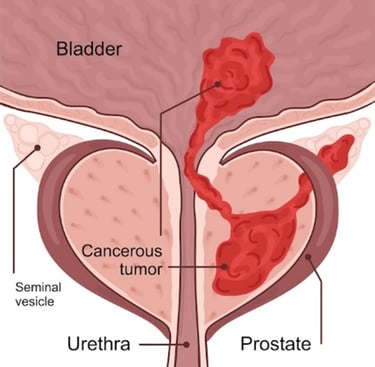Best Prostate Cancer Doctor in South Delhi | Leading Urologist Andrologist – Dr. Yasir Iqbal, South Delhi
Dr. Yasir Iqbal is a highly experienced Urologist and Andrologist with over 12 years of clinical expertise, known for his excellence in managing prostate cancer and a wide spectrum of urological disorders. Based in South Delhi, he is recognized for using modern and minimally invasive techniques, including radiation therapy, hormonal treatments, and advanced surgical approaches. His commitment to patient care ensures effective treatment outcomes with quicker recovery times and minimal discomfort. Prostate adenocarcinoma, Carcinoma of prostate, Cancer of prostate, Adenocarcinoma of prostate, Prostate carcinoma, Prostate malignancy, Prostate Tumour. Understanding the Prostate and Prostate Cancer The prostate is a small, walnut-sized gland that is part of the male reproductive system. It consists of two main lobes and is enclosed in a layer of tissue. Positioned just below the urinary bladder and in front of the rectum, the prostate surrounds the urethra—the tube responsible for carrying urine out of the body. In adult males, the prostate typically measures about 3 cm in thickness, 4 cm in width, and weighs around 20 grams. As men grow older, the gland often enlarges and can weigh between 40 to 100 grams or more, which may cause urinary symptoms. What is Prostate Cancer? Prostate cancer develops when certain cells in the prostate begin to grow and divide abnormally, forming a tumor. It is currently one of the top ten most common cancers affecting men in India. While it most often occurs in those over the age of 50, recent trends have shown a growing number of cases in men aged 35–44 and 55–64, especially in urban areas. In younger patients, prostate cancer can be more aggressive, whereas in older men, it generally progresses more slowly. Therefore, routine screening after the age of 50 is strongly recommended to detect the condition early and improve treatment outcomes. Diagnosis and Treatment Options Prostate cancer treatment depends on factors such as the stage of the disease, age, overall health, and aggressiveness of the tumor. Common approaches include: Regular screening (PSA blood test and digital rectal exam) Radiation therapy Hormone therapy Minimally invasive or robotic surgery Active surveillance for low-risk cases Early detection and the use of advanced medical techniques significantly improve the chances of successful treatment and a faster recovery.
Dr. Yasir Iqbal
5/22/20251 min read


My post content
